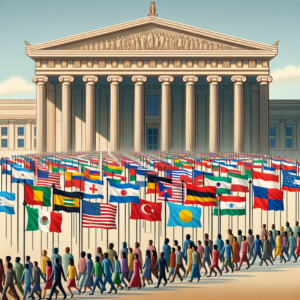Surge in Undocumented Immigrant Arrests: A Nation in Crisis
[caption id="attachment_37183" align="alignnone" width="639"] Visa Travel[/caption]
In recent months, the United States has witnessed a significant surge in the arrests of undocumented immigrants, prompting widespread concern and debate over the implications of current immigration policies. This increase has not only affected the individuals directly involved but has also reverberated through communities, families, and local governments across the nation. As the situation unfolds, it is essential to understand the factors driving this trend, its impact on society, and the responses from various stakeholders.
Understanding the Recent Surge in Undocumented Immigrant Arrests Across the Nation
The recent spike in undocumented immigrant arrests has been alarming, with reports indicating a rise of over 30% in enforcement actions compared to previous years. This trend has been particularly pronounced in border states, where local law enforcement agencies have increasingly collaborated with federal immigration authorities. The surge has been characterized by high-profile raids, increased surveillance, and a more aggressive stance on deportations. As a result, many undocumented immigrants are living in fear, unsure of their safety and the stability of their families. This situation has sparked a national conversation about the effectiveness and morality of current immigration enforcement practices.
Key Factors Contributing to the Increase in Immigration Enforcement Actions
Several key factors have contributed to the uptick in immigration enforcement actions. First and foremost, the political climate surrounding immigration has shifted dramatically, with a renewed focus on border security and the enforcement of existing immigration laws. The current administration has prioritized the apprehension and deportation of undocumented immigrants, leading to increased funding and resources for agencies like Immigration and Customs Enforcement (ICE). Additionally, the COVID-19 pandemic has exacerbated existing tensions, as economic instability and public health concerns have fueled anti-immigrant sentiment in some communities. These factors, combined with a lack of comprehensive immigration reform, have created an environment ripe for increased enforcement actions.
The Impact of Arrests on Communities and Families: A Growing Concern
The ramifications of the surge in undocumented immigrant arrests extend far beyond the individuals apprehended. Families are being torn apart, with many children left without their primary caregivers. The fear of deportation has led to a chilling effect within immigrant communities, where individuals are hesitant to seek medical care, report crimes, or engage with local services. This atmosphere of fear can have long-lasting effects on community cohesion and public safety. Moreover, the economic impact is significant, as many undocumented immigrants contribute to local economies through their labor and consumer spending. The loss of these individuals can strain local businesses and disrupt essential services, further complicating the situation for communities already facing challenges.
Legal and Humanitarian Implications of the Current Immigration Policies
The current immigration policies and enforcement strategies raise serious legal and humanitarian concerns. Critics argue that the aggressive tactics employed by federal agencies violate due process rights and disproportionately target vulnerable populations. Many undocumented immigrants have lived in the U.S. for years, contributing to society and raising families, yet they face the threat of sudden deportation without adequate legal representation. Humanitarian organizations have raised alarms about the conditions in detention facilities, where individuals may face overcrowding, inadequate medical care, and lack of access to legal resources. The ethical implications of these policies are profound, as they challenge the nation's commitment to human rights and the dignity of all individuals, regardless of their immigration status.
Responses from Advocacy Groups and Local Governments Amidst the Crisis
In response to the surge in arrests, advocacy groups and local governments have mobilized to protect the rights of undocumented immigrants and provide support to affected families. Many cities have declared themselves "sanctuary cities," implementing policies that limit cooperation with federal immigration enforcement. Advocacy organizations are offering legal assistance, resources, and community support to help individuals navigate the complexities of the immigration system. Additionally, grassroots movements have emerged, calling for comprehensive immigration reform and an end to the punitive measures that disproportionately affect immigrant communities. These efforts reflect a growing recognition of the need for a more humane and just approach to immigration policy.
Future Outlook: Potential Changes in Immigration Policy and Enforcement Strategies
Looking ahead, the future of immigration policy and enforcement strategies remains uncertain. While there is a growing consensus among advocacy groups and some lawmakers for comprehensive reform, political polarization continues to hinder progress. The upcoming elections may influence the direction of immigration policy, as candidates grapple with the competing demands of their constituents. Additionally, ongoing legal challenges to current enforcement practices may reshape the landscape of immigration law. As public awareness of the humanitarian implications of immigration enforcement grows, there is potential for a shift toward more compassionate policies that prioritize family unity and community well-being over punitive measures.
The surge in undocumented immigrant arrests represents a complex crisis that touches on legal, humanitarian, and social dimensions. As communities grapple with the consequences of increased enforcement actions, the need for a comprehensive and humane approach to immigration policy becomes increasingly urgent. The responses from advocacy groups and local governments highlight the resilience of affected communities and the ongoing struggle for justice and dignity. As the nation navigates this challenging landscape, the future of immigration policy will undoubtedly shape the lives of millions and define the character of American society for years to come.
